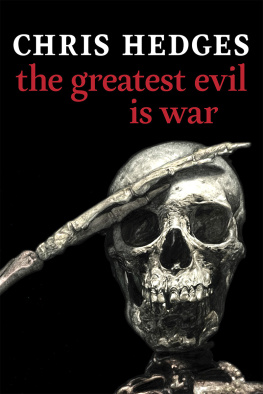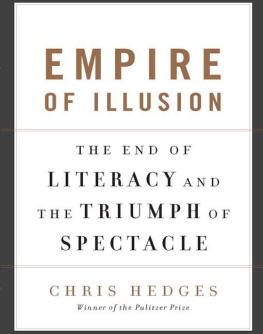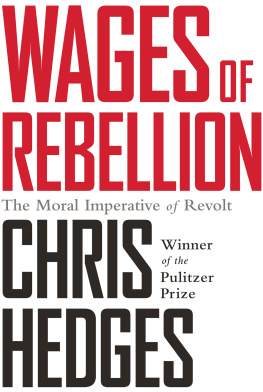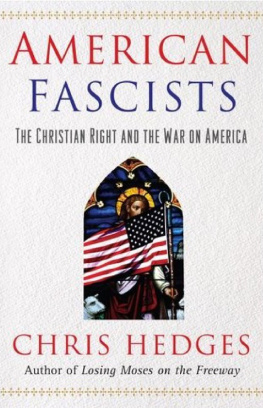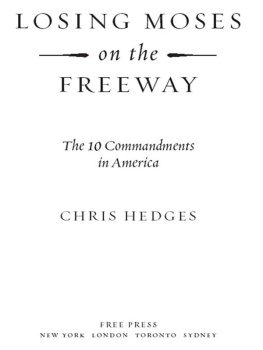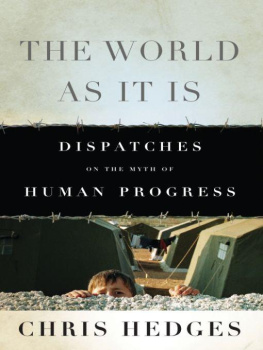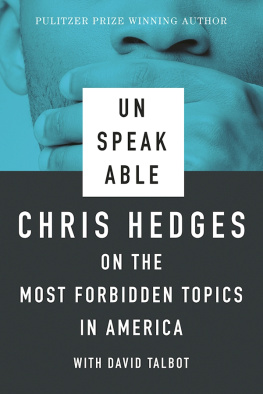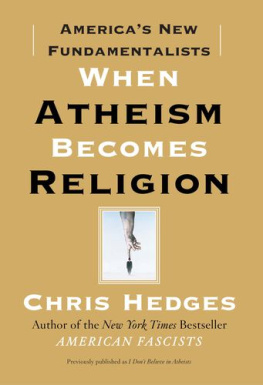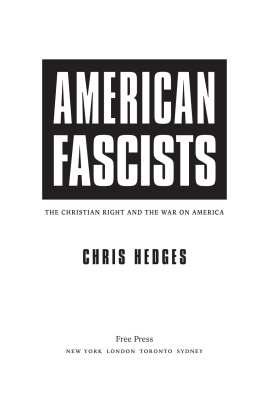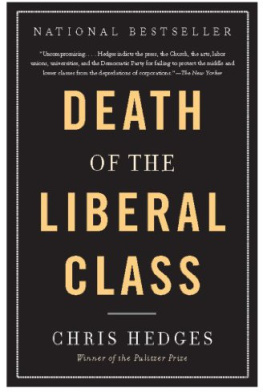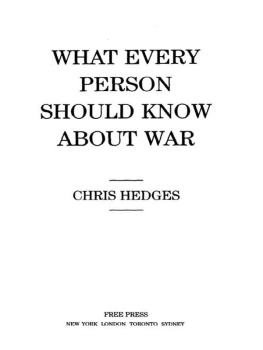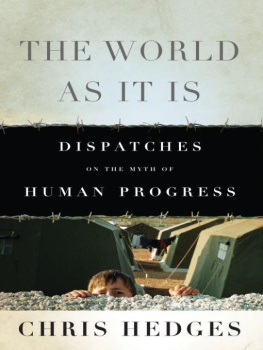the greatest evil is war
ALSO BY CHRIS HEDGES
Our Class: Trauma and Transformation in an American Prison
America: The Farewell Tour
Unspeakable
(with David Talbot)
Wages of Rebellion: The Moral Imperative of Revolt
War Is a Force That Gives Us Meaning
Days of Destruction, Days of Revolt
(with Joe Sacco)
The World as It Is: Dispatches on the Myth of Human Progress
Death of the Liberal Class
Empire of Illusion: The End of Literacy and the Triumph of Spectacle
When Atheism Becomes Religion: Americas New Fundamentalists
Collateral Damage: Americas War against Iraqi Civilians
(with Laila Al-Arian)
American Fascists: The Christian Right and the War on America
Losing Moses on the Freeway: The 10 Commandments in America
What Every Person Should Know about War
the greatest evil is war
CHRIS HEDGES
Seven Stories Press
new york oakland london
Copyright 2022 by Chris Hedges
All rights reserved. No part of this book may be reproduced, stored in a retrieval system, or transmitted in any form or by any means, including mechanical, electronic, photocopying, recording, or otherwise, without the prior written permission of the publisher.
Seven Stories Press
140 Watts Street
New York, NY 10013
www.sevenstories.com
Library of Congress Cataloging-in-Publication Data
Names: Hedges, Chris, author.
Title: The greatest evil is war / Chris Hedges.
Description: New York : Seven Stories Press, [2022] | Includes
bibliographical references and index.
Identifiers: LCCN 2022022165 | ISBN 9781644212936 (hardcover) | ISBN
9781644212943 (ebook)
Subjects: LCSH: War--Moral and ethical aspects. | War (Philosophy)
Classification: LCC JZ6392.H43 2022 | DDC 172/.42--dc23/eng/20220707
LC record available at https://lccn.loc.gov/2022022165
Permission to reprint Tomas Youngs letter to Bush and Cheney, courtesy of Claudia Young.
Permission to reprint excerpts from Jessica Goodells Shade It Black: Death and After in Iraq, courtesy of Casemate Publishers.
Brian Turner, Ashbah from Here, Bullet. Copyright 2005 by Brian Turner. Reprinted with the permission of 3e Permissions Company, LLC on behalf of Alice James Books, www.alicejamesbooks.org.
College professors and high school and middle school teachers may order free examination copies of Seven Stories Press titles. Visit https://www.sevenstories.com/pg/resources-academics or email academics@sevenstories.com.
Printed in the USA.
9 8 7 6 5 4 3 2 1
For Kurt Schork and Miguel Gil Moreno de Mora, killed on May 24, 2000, in an ambush in Sierra Leone.
Everything created by violence is senseless and useless. It exists without a future; it will leave no trace.
VASILY GROSSMAN
CONTENTS
I.
The Greatest Evil Is War
Preemptive war, whether in Iraq or Ukraine, is a war crime. It does not matter if the war is launched on the basis of lies and fabrications, as was the case in Iraq, or because of the breaking of a series of agreements with Russia, including the promise by Washington not to extend NATO beyond the borders of a unified Germany, not to deploy thousands of NATO troops in Central and Eastern Europe, and not to meddle in the internal affairs of nations on Russias border, as well as the refusal to implement the Minsk peace agreement. The invasion of Ukraine would, I expect, never have happened if these promises had been kept. Russia has every right to feel threatened, betrayed, and angry. But to understand is not to condone. The invasion of Ukraine, under post-Nuremberg laws, is a criminal war of aggression.
I know the instrument of war. War is not politics by other means. It is demonic. I spent two decades as a war correspondent in Central America, the Middle East, Africa, and the Balkans, where I covered the wars in Bosnia and Kosovo. I carry within me the ghosts of dozens of those swallowed up in the violence, including my close friend, Reuters correspondent Kurt Schork, who was killed in an ambush in Sierra Leone with another friend, Miguel Gil Moreno de Mora.
I know the chaos and disorientation of war, the constant uncertainty and confusion. In a firefight you are only aware of what is happening a few feet around you. You desperately, and not always successfully, struggle to figure out where the firing is coming from to avoid being hit.
I have felt the helplessness and paralyzing fear which, years later, descend on me like a freight train in the middle of the night, leaving me wrapped in coils of terror, my heart racing, my body dripping with sweat.
I have heard the wails of those convulsed by grief as they clutch the bodies of friends and family, including children. I hear them still. It does not matter the language. Spanish. Arabic. Hebrew. Dinka. Serbo-Croatian. Albanian. Ukrainian. Russian. Death cuts through the linguistic barriers.
I know what wounds look like. Legs blown off. Heads imploded into a bloody, pulpy mass. Gaping holes in stomachs. Pools of blood. Cries of the dying, sometimes for their mothers. And the smell. The smell of death. The supreme sacrifice made for Eies and maggots.
I was beaten by Iraqi and Saudi secret police. I was taken prisoner by the Contras in Nicaragua, who radioed back to their base in Honduras to see if they should kill me, and again in Basra after the first Gulf War in Iraq, never knowing if I would be executed, under constant guard and often without food, drinking out of mud puddles.
The primary lesson in war is that we as distinct individuals do not matter. We become numbers. Fodder. Objects. Life, once precious and sacred, becomes meaningless, sacrificed to the insatiable appetite of Mars. No one in wartime is exempt. We were expendable, Eugene Sledge wrote of his experiences as a Marine in the South Pacific in World War II.
Sledge recalls a young Marine officer who had one ghoulish, obscene tendency of urinating into the mouths of Japanese corpses.
The landscape of war is hallucinogenic. Sledge calls it the kaleidoscope of the unreal.
You have no concept of time in a firefight. A few minutes. A few hours. War, in an instant, obliterates homes and communities, all that was once familiar, and leaves behind smoldering ruins and a trauma that you carry for the rest of your life. I have tasted enough of war, enough of my own fear, my body turned to jelly, to know that war is always evil, the purest expression of death, dressed up in patriotic cant about liberty and democracy and sold to the nave as a ticket to glory, honor, and courage. It is a toxic and seductive elixir. Those who survive, as Kurt Vonnegut wrote, struggle afterwards to reinvent themselves and their universe, which, on some level, will never make sense again.
Walt Whitman, who tended wounded soldiers in hospitals during the Civil War, wrote in a heading in his notebook: The real war will never get in the books.
Its interior history will not only never be written, Whitman argues, its practicality, minutiae of deeds and passions, will never be even suggested.
War destroys all systems that sustain and nurture lifefamilial, economic, cultural, political, environmental, and social. Once war begins, no one, even those nominally in charge of waging war, knows what will happen, how the war will develop, how it can drive armies and nations towards suicidal folly. There are no good wars. None. This includes World War II, which has been sanitized and mythologized to celebrate American heroism, purity, and goodness. If truth is the first casualty in war, ambiguity is the second. The bellicose rhetoric embraced and amplified by the American press, demonizing Vladimir Putin and elevating the Ukrainians to the status of demigods, demanding more robust military intervention along with the crippling sanctions designed to bring down Putins government, is infantile and dangerous. That the inverse version of the conflict is true in the Russian media fuels the insanity.

